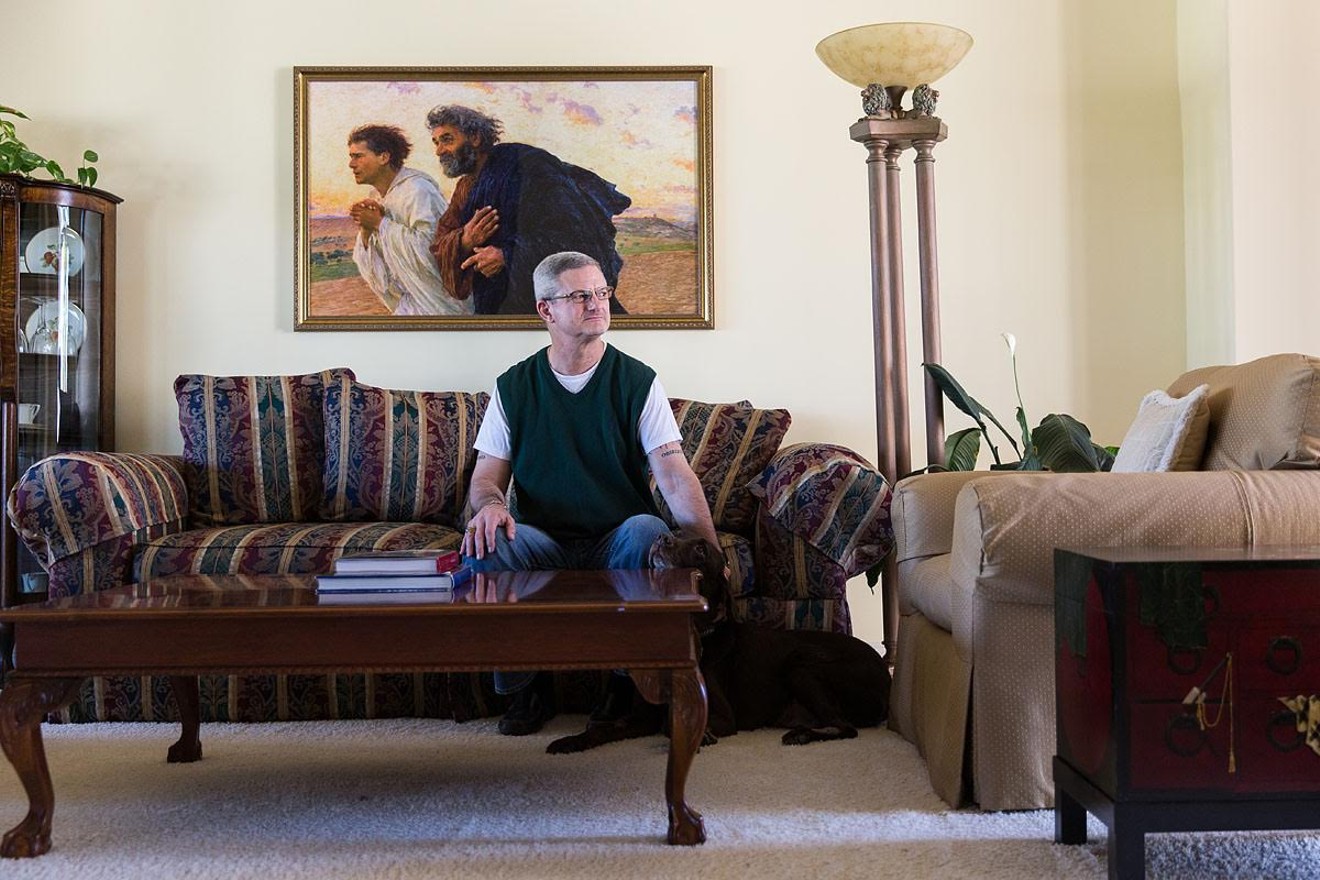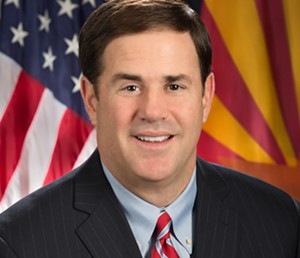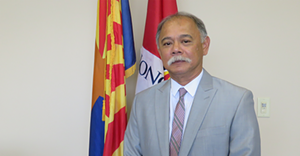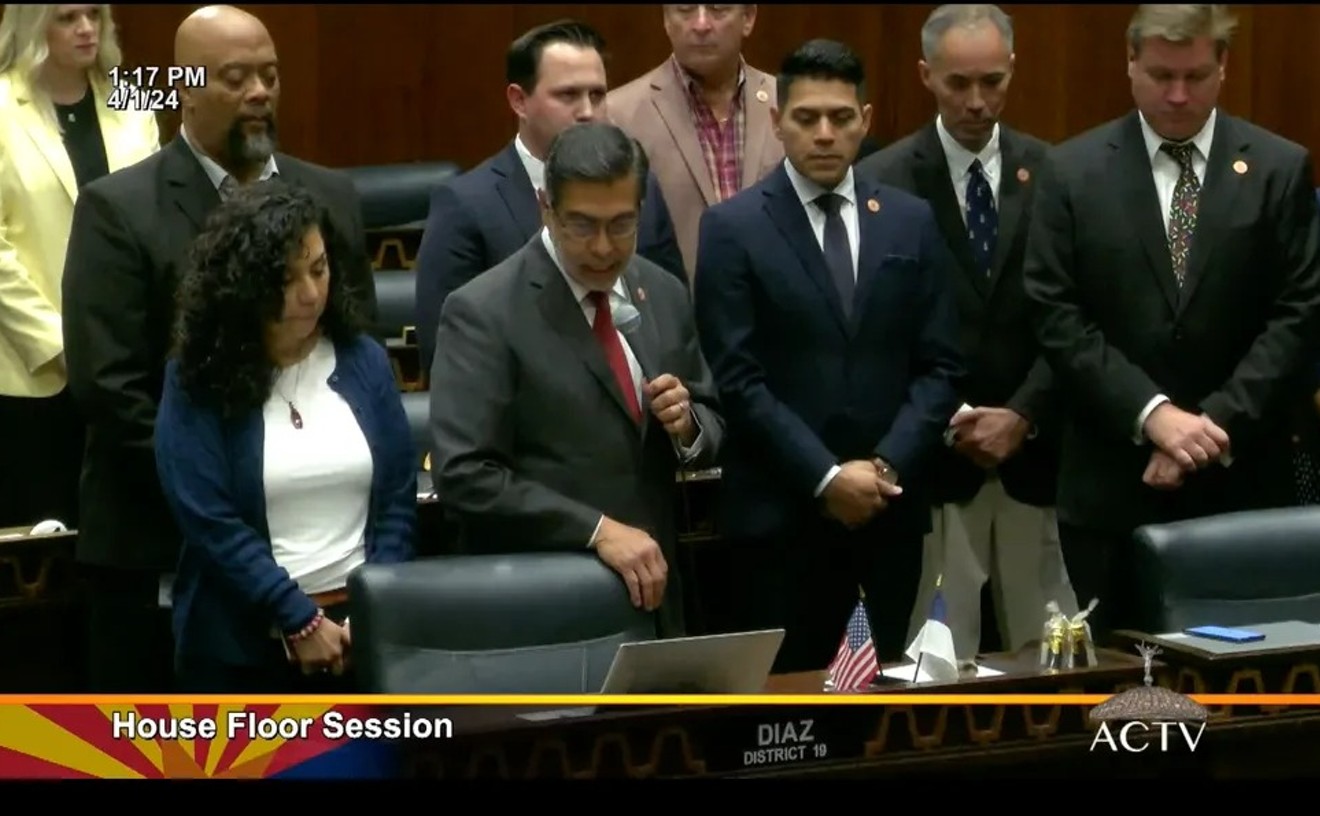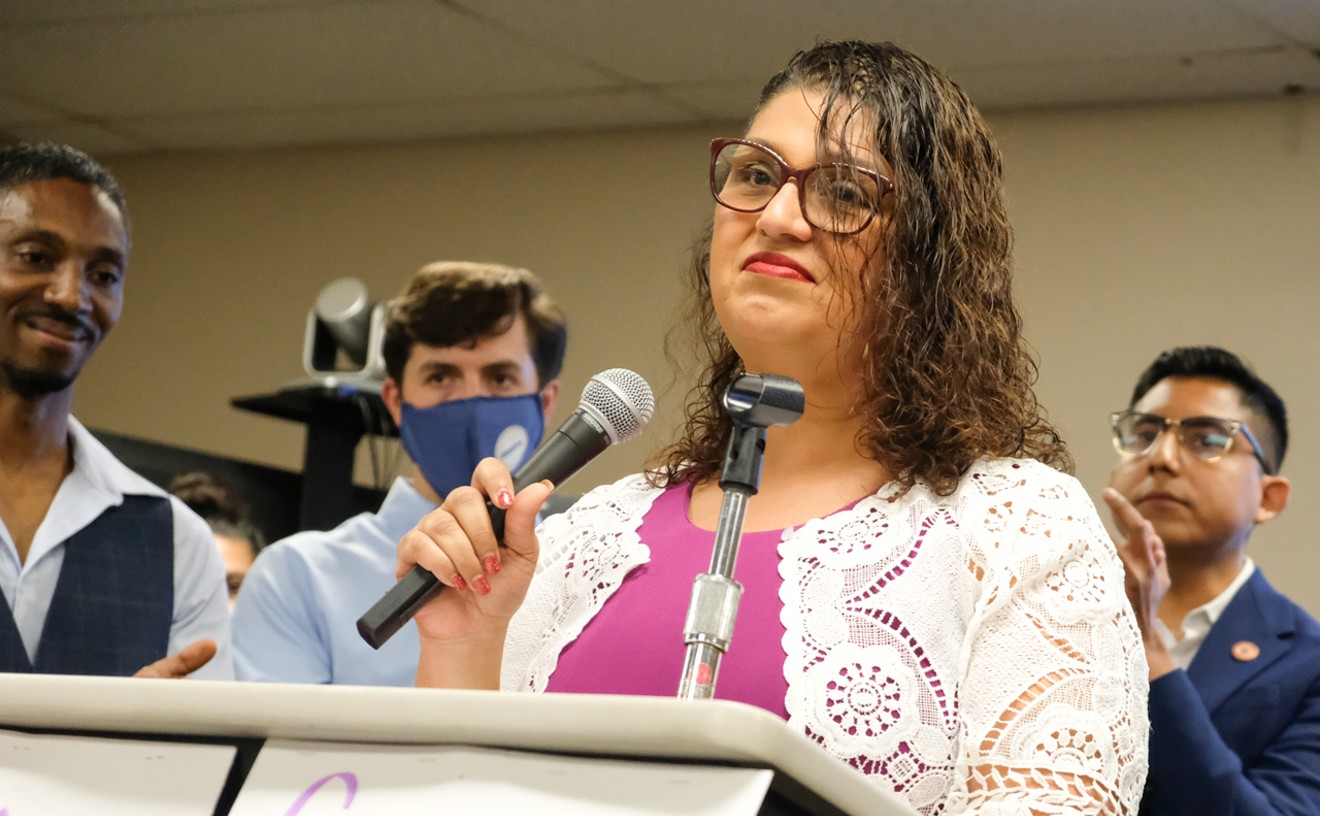Growing up in Sacramento, California, in the late 1970s, Michael and his two younger brothers, Tim and Randy, became especially close as their parents' marriage fell apart.
Tim saw Michael as a mentor and protector against their father, who, Tim says, sometimes hit Michael and their mother.
But as he got older, Michael's sense of responsibility disappeared.
When he was 22 and homeless in Colorado Springs, Colorado, Michael became the target of a group of young people who were squatting in an abandoned house."I own the mistakes I made. I own the hard lessons I learned about politics." — Tim Jeffries
tweet this
He called Tim in October 1981, complaining that the group was bullying him.
On November 3, Michael was kidnapped and driven to a rural area in the mountains.
Two of the attackers stabbed Michael 65 times. One of them, Anthony Fiorella, 28, delivered the final blow by crushing Michael's skull with his boot.
Michael's remains were found in the woods a month later.
The murder was one of the most sensational crimes of the time in Colorado. And it changed Tim Jeffries' worldview.
He became a lifelong activist for victims' rights – and against bullies and criminals.
He made a small fortune in his various business ventures over the years, serving in executive positions at 1st West Mergers and Acquisitions, Mission Technology Group, and IHS, which owns the well-known Jane's weapons guides.
Then, in 2015, came a career opportunity that seemed almost divinely inspired.
New Arizona Governor Doug Ducey made him director of the Arizona Department of Economic Security.
It was a chance for Jeffries to engage his management and people skills like never before, energize a stodgy bureaucracy, and express his love for Catholicism and the poor in a dramatic way.
One problem: Jeffries believed that the state agency, which had about 7,600 employees in offices throughout Arizona, was chock-full of bullies.
In November 2016, after just 21 months on the job, Jeffries resigned from the DES in disgrace.
He agreed to an interview with Phoenix New Times at his Scottsdale home in January.
Jeffries, 54, has short hair of gray and white and a face that’s quick to smile. He sat on a couch wearing casual clothes, sporting facial hair — a contrast to the clean-shaven look he always presented at DES as "Director J."
He projected a tinge of sadness along with the anger about what happened to him. His old dog, Buddy, a chocolate Labrador, limped around the family room with one leg in bandages – cancer – as two housekeepers tidied up in another part of the home.
"I own the mistakes I made," he admitted. "I own the hard lessons I learned about politics."
But in the end, he went on, it was much worse than politics.
Enemies within state government and the media moved to "bleed me publicly and kill me politically," he said.
Jeffries has been on a self-promotion tour since the first of the year, hoping to salvage his reputation.
He portrays himself as a victim of bullying, of a "manufactured crisis."
It was manufactured, he explained, by the media, Democrats, government cronies, anti-Catholic bigots – and even the governor.
When questioned on this, however, he doesn’t deny that he's the "common denominator" of the crisis.
As the largest state agency, the DES manages public benefits for qualifying residents like welfare, food assistance, child support, and unemployment benefits.
The DES has been a fairly quiet place since being separated in 2013 from the always controversial Department of Child Services.
Jeffries turned that on its head.
He made the DES into headline news.
Often, it was for the wrong reasons. His religion, politics, and paranoia all became issues.
So did his eccentricities.
He made the classic, yellow smiley face the unofficial mascot of DES, for example. He had one next to his name on his office door, and ordered them stitched on the backs of 300 security-officer uniforms.
He was best known for inspiring loyalty among the thousands of DES employees he says he "loves" – and for inspiring fear by having hundreds of them fired, many without good cause.
"Bullies," "liars," "slackers," and "bad actors," he labeled the vanquished.
Jeffries made plenty of fans with his public statements about clearing the agency of dead wood, and his intense campaign of reaching out personally to DES employees. Many conservatives appreciated his religious flourishes.
Jeffries was Ducey's angel before falling from grace.
Now, he looks like the governor's biggest mistake.
The governor, a conservative Republican and former state treasurer, was a businessman before voters elected him to the state's highest office in November 2014.
He hired Jeffries to represent the governor’s big heart for the poor, as Jeffries had put it during his confirmation hearing before a State Senate panel in early 2015.
The appointment comported with Ducey’s official policy of bringing the “speed of business” into his administration.
It also met his unofficial policy of hiring business people as agency heads who, while having little or no experience working in government, were connected to Arizona’s Republican network.
Some of that policy had already begun to unravel before Ducey felt compelled to get rid of Jeffries late last year.
Ducey systematically fired four of his appointees in 2016 in the wake of negative attention by the news media.
Tony Bouie, former state lottery director, was asked to resign in January 2016, two days after a New Times article about him that focused on alleged abuse of a state vehicle and cronyism.
David Farca, former Arizona-Mexico Commission president, stepped down following a September article in New Times that covered his personal business problems and a lawsuit against him.
Ducey dismissed state Juvenile Corrections Director Dona Maria Markley in September following articles in the Arizona Republic about harsh firing practices in that agency.
He got rid of Jeffries the day before Thanksgiving, following a flurry of articles and opinion columns in the Arizona Republic over the preceding weeks about inappropriate firing practices and other allegations.
But by then, numerous problems with Jeffries – including his callous mass terminations – had been detailed in 2015 and 2016 by New Times and Arizona Capitol Times.
Because of that, a looming question remains: Why didn’t Ducey investigate Jeffries sooner?
The governor’s office won’t talk publicly about the case.
Jeffries started his freshman year in college in 1981 as scheduled at Santa Clara University in California, his heart bruised by the death of his older brother.
Outwardly, he was jovial; he played on the school’s football team and entertained crowds with his "Lizard Man" mask and cheerleading routine at games.
Inside, he dwelled on what he considers the raw "evil" that had not only taken the life of his brother, but – as he sees it – threatens good people everywhere.
He was entranced with the Sovereign Military Order of Malta, a 1,000-year-old Catholic order that focuses on helping the sick.
Jeffries had his left arm tattooed with the Latin phrase Obsequium Pauperum (obedience to the poor). Later, as a successful businessman, he began adding the title KM, for Knight of Malta, to his name.
He also found comfort in politics. He ran successfully for a four-year term on the nonpartisan Santa Clara City Council in 1990. The law-and-order stance often ascribed to the right wing, which dovetailed with his religious beliefs, attracted him strongly.
Jeffries’ activism began with his years-long effort to keep Michael’s killer behind bars.
Police arrested five people in connection with the crime, but only Fiorella and Tim Daugherty were charged with murder.
Daugherty reportedly hanged himself in jail about a month after the crime.
Fiorella remains incarcerated in Colorado.
He was first up for parole in 2001, and now, every few years, Tim Jeffries works to ensures that Fiorella’s parole will be denied.
Over time, Jeffries has been involved with, and served on the boards of, various victims’-rights groups including Parents of Murdered Children and the National Organization for Victims Assistance.
Jeffries has testified before Congress for victims’-rights bills and, in 2009, against the appointment of Judge Sonia Sotomayor – whom he sees as weak on crime – to the U.S. Supreme Court.
He bought a home in Arizona in the early 2000s while working for another company, and splits his time between here and Colorado.
He lobbied heavily for a new Arizona law that stiffened sentences for murderers, which former Governor Jan Brewer signed into law in 2012.
Along the way, Jeffries made some friends in high places.
When Ducey took office and created his new cabinet, he gave the DES job to Jeffries, who had never previously had a full-time job in government or social service. The pay was pretty good – $212,250 annually, plus perquisites.
In return, the state got a man whose management style was later compared to that of a cult leader.
"Integrity," Jeffries told a crowd of about 100 DES employees at one of his town hall meetings on August 15, 2015. "Never lie, cheat, steal, bully, retaliate, coerce mankind. Never."
Dressed down in a red polo shirt, he strolled back and forth on the stage like a preacher, his tone laced with tough love and admonishment.
He soon violated that advice. But back then, a few months after he started as director, he held himself out as the "anti-bureaucrat" who would bring law and order to a neglected agency.
Jeffries put his heart out there for many employees, gushing often to them and others that he "loved" them.
He called them "colleagues," not employees, and asked them to share a personal relationship with him, ostensibly for the betterment of the agency. He often weaved his brother Michael’s tale into his talks to help make the connection.
The change was refreshing to many, and highly atypical for a DES director. Clarence Carter, the previous director appointed by former Governor Jan Brewer, was aloof and distant to employees.
Jeffries answered thousands of e-mails personally, made dozens of morale-boosting videos, visited each of the state's 120 DES satellite offices, and held pep talks, "town halls," and parties with his colleagues.
Many employees viewed him as their savior – someone who could rescue them from an abusive, dull, or incompetently run workplace.
But his leadership style had another, colder side, as his August 2015 speech revealed.
"I’ve introduced something very new into this agency – something very new into this state," he told the crowd. "It’s called same-day exit."
He took a long pause to let the concept sink in.
"I have encountered egregious bullies in this agency," he continued. "And if they’ve not been exited the same day, they’ve been exited within days. Given the fact that my father beat on my mother, beat on my big brother, and my brother was bullied through his life, and murdered – mercilessly so – I have a visceral loathing for bullies."
Jeffries sent a video of his speech to the entire DES staff, along with an e-mail to reinforce his message, which concluded, “So, bullies, beware! And, deceit, be gone.”
In fact, Jeffries had combined his loathing for bullies with a written order from Ducey to shrink the size of his agency and get rid of the “worst” people.
The policy quickly turned into a metaphorical bloodbath. By November 2015, more than 200 people had been fired.
New Times broke the story of the firings in an October 14, 2015, article, describing how 72 people had been fired in the past 90 days alone. In that article and a follow-up, Jeffries didn’t back down in an interview from labeling the terminated employees "bullies," "liars," "slackers," and "racists.""Everybody wants to get out. They think it’s going to get worse… There is no due process." — DES employee in late 2015.
tweet this
An avalanche of press attention followed, including an October 23 article by Ben Giles of the Arizona Capitol Times, quoting Ducey as saying he was "skeptical" of the New Times reports.
Daniel Scarpinato, Ducey's spokesman, told Giles that Ducey has "been very clear on the need to reform state government. He didn’t bring in people from outside state government to do things the way they’ve always been done. If we could clone [Jeffries], we would."
But as a November 4, 2015, New Times article reported, the firing program was on a mass scale, and whether everyone fired deserved to be was very much in question.
Several years earlier, under Governor Brewer, a new law moved most state employees off merit status. Now, the majority can be fired for any reason and without the benefit of an appeal. It’s all in the name of streamlined government.
Jeffries made vigorous use of this new system.
Some of the firings appeared to be random layoffs. For instance, small DES divisions like the offices of Business and Finance, and Communications, each found two supposedly bad employees in 2015 and fired them.
Most of the fired employees were later replaced, anyway, contradicting the idea that Jeffries was really shrinking state government.
Jeffries replaced half of his 30 assistant directors with new people, a move that helped engender loyalty to him.
The 2015 New Times article quotes numerous employees, but they asked to remain anonymous. They described a haphazard, fear-inducing system of terminations.
Bullies were left in some supervisory jobs as "good" people lost their jobs, some claimed. Employees with 15 or more years on the job were told to leave for reasons that reportedly weren’t well justified.
One longtime ex-employee sued in federal court, alleging she was retaliated against for exposing waste at the agency. She later dropped the suit. Other fired employees said they expected to be treated better after working for the agency for years, and that an appeal process would have cleared them.
"Everybody wants to get out," one employee told the newspaper. "They think it’s going to get worse … There is no due process."
Another later said that if Jeffries showed up unexpectedly in an office, employees might break out in tears, worried they were about to be fired.
Jeffries insisted that everyone fired had been "let go for proper cause."
Few would agree.
The governor’s continued support emboldened Jeffries, and the firings picked up pace in 2016.
Ultimately, nearly 500 people were fired during Jeffries' reign.
In June of last year, Elizabeth Grigg, a supervisor in the child-support division, filed a whistleblower complaint with the Arizona State Personnel Board after she was fired.
Jeffries retaliated against her, she claimed, for failing to fire six employees at once. She claimed that Jeffries ordered the terminations after the employees had included negative comments about their job in a survey.
Jeffries told the news media that he would never do such a thing, and that he valued employee input in surveys because it helped him identify problems in the agency.
Todd Templeton, who was Grigg’s supervisor at the time, told New Times that Grigg spoke the truth.
He was an IT specialist who had worked for the child-support division for 2 1/2 years. He was in the room with Jeffries, Grigg, and others on June 7, he said, when she told Jeffries that two people on her team of 16 had negative attitudes that infected others and brought down the team’s survey scores.
Jeffries told her to fire half the team, Templeton said. Grigg "talked him down to six."
But later, in an e-mail, Templeton complained to Grigg about Jeffries' "style," writing that "this feels like carpet bombing when a surgical strike is ordered."
Grigg refused to fire the six employees, and she was fired two weeks later.
After her termination, Templeton’s e-mail from the whistleblower investigation became public record. Jeffries, Templeton said, fired him for it.
"I think terminating Liz and me in a fit of pique over some injudicious wording in an e-mail was the wrong thing to do, and it hurt the agency," he said. "Prior to this incident, I had a fair amount of respect for Jeffries and what he was trying to accomplish."
Her personnel complaint didn’t pan out. But state officials later investigated Grigg's case and determined that she was fired improperly.
She was among 40 people who were later offered their jobs back.
Templeton applied but failed to get his job back.
He's been unemployed for eight months now.
Jeffries encouraged employees to call him "Director J" or even "Mojo Man."
In private, some employees called him "Jesus Jr."
Without apology, Jeffries injected Catholicism into the culture of DES as part of his incessant attempts to uplift spirits.
One of the first things he did when he moved into his new office at the DES headquarters, 1717 West Jefferson Street, was hang a crucifix above his door.
Jeffries distributed a PowerPoint presentation titled "The Seven Tenets of Catholic Social Teaching," sent emails about Mother Teresa and her supposed miracles. He made liberal use of the state’s motto, Ditat Deus (God Enriches), in documents and letters.
His greatest publicity coup came in April 2016, after New Times broke the story of what he calls "the Lourdes e-mail."
That month, Jeffries sent an e-mail to all DES employees inviting them to give him prayer letters he could take on the pilgrimage he makes each year with his wife to a Catholic shrine in Lourdes, France.
He received more than 200 letters, and had an assistant at DES help sort them. He said he printed them out at home before taking them on his trip.
After the national Freedom From Religion Foundation sent an official complaint, the state Attorney General’s Office defended him. In an August 10, 2016, letter, the AG’s office wrote that what he did was protected under the First Amendment.
The flap caught attention from news sites around the country, boosting Jeffries' status as a right-wing hero. The National Review and other conservative publications wrote articles praising Jeffries for standing up to political correctness.
The support he received, plus a fresh round of anonymous criticism, inspired Jeffries to address his "haters" in another e-mail he sent all 7,600 employees.
"To the Haters in Our Great DES," he wrote. "Your ongoing distrust, dislike, and discounting of the beautiful things in play at our great and noble agency weigh very heavy on my heart … I also hope you will cease your covert attacks, and simply engage me directly so we can learn from each other."
Tory Anderson, a lobbyist for the Secular Coalition for Arizona, said her organization had been receiving complaints from DES employees who felt Jeffries’ use of religion in the workplace was "inappropriate and coercive."
Jeffries disagrees that the use of religion was intimidating for some employees.
The case of DES supervisor Gary Phillips shows why he's wrong.
Phillips, a disabled veteran, worked for the DES as a local veterans'-employment representative in 2016. He’d been at the agency for two decades, and had been a supervisor for four years.
He was alleged to be a bully who had sexually harassed women in his office and created a hostile workplace, according to a DES investigation.
Jeffries wanted to make an example of him and, at the same time, showcase his new-and-improved DES security division.
Earlier in 2016, Jeffries hired Juan "Jay" Arcellana to lead the DES Office of Inspector General (OIG) and manage a ramp-up in security at the agency.
The OIG employed 180 people, including 13 sworn officers. But Jeffries told Arcellana and Charles Loftus, Jeffries’ handpicked chief of security, to put more guns in the hand of qualified employees.
Jeffries is very concerned about Islamist terrorism, and the attack by professed jihadists in December 2015 on a social-service office in San Bernardino, California, had rattled him.
He also ordered the replacement of the agency's contract security guards with a new force of officers who would be hired and trained internally by the DES OIG’s Protective Services division.
These fresh recruits received new uniforms – which would have a yellow smiley face on the back. On the sleeves were the phrases Ditat Deus and something Jeffries had made up, Samaritanus Protectores, which to Jeffries has a religious connotation.
One of Arcellana's most important tasks was to investigate DES workers.
It was another of Jeffries' promises to the public – holding DES employees "accountable." After he started as director, Jeffries routinely had news releases sent out that told of employees charged with government-benefits fraud.
Phillips received star treatment, so to speak, from the OIG.
Following an internal probe, Arcellana had the AG's office review the case. According to a New Times source, he was told the criminal case was weak and wouldn't hold up in court.
Nevertheless, under Jeffries' orders, OIG officers arrested Phillips on April 12 at his desk. He was taken out in handcuffs.
The DES published a news release stating that Phillips had committed "physical assault" more than once on one of his subordinates.
The DES held back the investigative report on Phillips' case for months. When it was finally released, it showed that Phillips' alleged crime was more like sexual harassment: The "assault" involved Phillips touching the woman's leg on two separate occasions.
The Maricopa County Attorney's Office never filed criminal charges in the case.
Totally missing from the April news release was any mention of Phillips using his religion to bully his workers.
Yet, as the report reviewed by New Times shows, that was a prime factor in the hostile workplace he created.
"Phillips frequently ministered to employees in the DES office," one woman told investigators. The woman "stated that she is not a religious person and felt uncomfortable in those times when Mr. Phillips suggested praying with him."
He once asked her to hold hands and pray with him immediately after completing her annual evaluation, she reported.
The woman "felt compelled to go along with Mr. Phillips in these prayer sessions because she did not want to offend Mr. Phillips as her supervisor," the report states.
Another woman said she was very religious, but still felt uncomfortable and "obligated to participate" in Phillips' ministering because he was her boss.
The problem echoes the second complaint sent to Jeffries in 2016 by Madeline Ziegler, president of the Freedom From Religion Foundation:
"Hundreds of department employees are atheists or agnostics, and hundreds more are non-Christians," she wrote. "These employees are made to feel like they are outsiders on the basis of their lack of Christian belief."
The beginning of the end for Jeffries may have come with his pursuit of criminal charges for Cecilia Velasquez, a Democratic State Representative.
As a chain of June e-mails show, the Velasquez case created tension among the DES, the governor's office, and the state Attorney General's Office.
Velasquez, a Phoenix-area lawmaker in her first term, was indicted by a grand jury on June 22, accused of $1,700 in food-stamp fraud.
Ducey's Republican administration was excited about the crime, since it put Democrats in such a bad light.
The DES OIG had conducted the investigation, and Jeffries wanted to tell the world of the DES "victory."
He wanted Velasquez arrested at the State Capitol. The AG's office shot down the idea.
Jeffries had his spokeswoman, Tasya Peterson, issue a news release about the indictment.
A short while later, Peterson received an angry call from Ryan Anderson, the AG’s spokesman and advisor.
For months, Arizona Attorney General Mark Brnovich had been concerned about the way Jeffries had been using the DES OIG like his own personal police force.
Anderson told Peterson his bosses were "red hot" about the news release. It implied incorrectly that the AG's office helped with and signed off on the case.
The AG’s office had, in fact, been involved: Officials had advised the DES OIG to avoid overcharging Velasquez. She ended up indicted on three felony counts. (She later received a year of probation after pleading guilty to a misdemeanor, and didn't run for office again.)
Anderson accused the DES of using the news release to sensationalize the case, and told Peterson the AG's office should have been notified about the release.
Anderson also expressed concern that the DES had let out too much information: Under federal law, the recipients of food stamps and other public benefits can't be named publicly, but Peterson’s news release said Velasquez was suspected of fraud and unlawful use of food stamps.
"Ryan Anderson with the AG's Office called Tasya and was rude, belligerent, and unprofessional," Jeffries wrote in a complaint letter to Ducey's office. "She was deeply insulted and offended by his unwarranted aggression. In my opinion, he sought to bully her."
Jeffries continued that he planned to report the squabble to Brnovich and others.
"Due to my red hot intensity regarding less than noble men, it would be fair to say my descriptors for Mr. Anderson were in-artful," he wrote in the e-mail addressed to Daniel Scarpinato, Ducey's deputy chief of staff and spokesman, and Mike Liburdi, Ducey's chief counsel.
Jeffries maintains that, by then, he had already fallen into disfavor over the issue at the governor's office. He said the problem began when he told Ducey's chief of staff, Kirk Adams, that he planned to target more lawmakers.
"They knew we were investigating another legislator," said one of Jeffries' former top staff members, who declined to be named for this article.
Jeffries agreed with that, but said it was a former Democratic lawmaker whom he could not name "directly."
He claims Adams, a Republican and former Arizona House Speaker, was concerned about the prospect of more investigations.
In Jeffries' mind, the conspiracy to bring him down had taken shape.
The situation with Anderson and the AG's office weighed heavily on Jeffries' mind two days later, he said, when DES employee Andy Hall sent two relatively innocuous e-mails.
Hall, a 69-year-old worker in the DES Adult Disabilities division, criticized an article that Peterson e-mailed to DES employees about Velasquez's future in the State Legislature.
"This is purely politics. It has nothing to do with DES business," Hall e-mailed Peterson on Friday, June 24, 2016.
She immediately forwarded Hall's e-mail to her boss.
Jeffries swiftly made up his mind about Hall. In an e-mail, he told Todd Bright, then the deputy chief of operations, that Hall was obviously not on "the Team," "not particularly smart," and should be fired the following Friday.
Peterson also wrote back to Hall, telling him that the information in the Velasquez news article related to the DES investigation that had resulted in the lawmaker's indictment.
"Actually this is just about Democrat party politics," he responded. "Please stick to DES business."
Peterson sent that one off to Jeffries, too.
"Todd, this guy is an idiot," Jeffries told Bright, 17 minutes after Hall sent his second e-mail. "Move him out, preferably now today" [sic].
Hall had worked for the DES for nine years, and had put in a total of 22 years in various Arizona agencies.
He had planned to retire this year, so he wasn't afraid to speak his mind. Many employees felt that Jeffries’ call to “haters” to contact him was a trap – that they'd be fired if they criticized Jeffries directly.
Hall's case seems to confirm that.
"I wouldn't call [Jeffries] a liar or a hypocrite – but he has engaged in hypocrisy," Hall told New Times. "There's a whole Jekyll-and-Hyde aspect to his personality. He loves people to death, but if he senses any questioning of his authority, all of a sudden he turns on you."
Hall was one of 40 people the state decided to reinstate to jobs at DES following Jeffries' removal. He turned down the offer and decided to retire instead.
But he's not letting go entirely.
He also has a problem with Peterson, whom he sees as a Jeffries acolyte who was culpable in his firing.
Peterson was one of Jeffries' most treasured colleagues; he gave her a 10 percent raise soon after he started as director, boosting her annual pay to $103,950.
Hall filed a complaint against her with the AG's office, alleging that she violated state employee standards of conduct in his firing.
Peterson's got her own connections in the governor's office, though, and remains on the job.
Her husband, Christian Palmer – who, like Peterson, is a former news reporter – served as communications director for Ducey's Prop 123 education-funding campaign in May 2016.
If Peterson ever had concern about her boss, there's no evidence she ever told Ducey's office about it.
Jeffries suffered a flood of bad press several weeks before Craig Harris of the Arizona Republic moved in for the kill.
In late August, Hank Stephenson of the Arizona Capitol Times unleashed the tale of what Jeffries allegedly did to Grigg.
New Times followed that story in mid-September, adding more details of employees – still unnamed – who complained about the rampant firings and cult-like atmosphere at the DES that Jeffries had created.
When employees started work in the morning, for example, their computers would automatically play a morale-boosting video, usually starring Jeffries.
"I'm just here to say, 'Have a yippee-ki-yay day!’” a cowboy-hat-wearing Jeffries says in one of the videos.

The "idiot" email sent by Jeffries after an employee asked his assistant to "stick to DES business."
Ray Stern
"Thank you again for your humility, your passion and your inspiration!" went one of the many letters of adulation Jeffries received. "With much respect and thanks, DITAT DEUS."
In late September, New Times reported that Jeffries had sent a one-sided political message to all DES employees that may have violated the law.
He was an ardent foe of Prop 205, the marijuana-legalization initiative that voters rejected 48-52. He donated $1,500 to the opposition group and railed against the measure twice on the AM radio show hosted by the group's chairman, Seth Leibsohn.
On September 25, Jeffries sent an anti-Prop 205 diatribe written by Leibsohn over DES e-mail. He told employees, "You be the judge," but didn't provide the other side of the debate.
Arizona law forbids the use of state resources to influence an election. Unlike with his Catholic-promoting e-mails, the AG's office didn't back up Jeffries this time. Instead, he was warned not to do it again.
Jeffries maintains that his e-mail wasn't one-sided, though he admits it was a "big mistake" to send it.
A week later, on October 2, a New Times reporter appeared on the Channel 12 News (KPNX-TV) show Sunday Square-Off and discussed the political e-mail and number of terminations at the agency under Jeffries, which by then was approaching 500.
On October 17, Harris' first story on the DES firings appeared, focusing on the high pace of terminations at DES and other state agencies under Ducey.
The DES made up about one-third of the 1,500 terminations of state employees since Ducey took office and implemented a program to reduce the size of state government, he reported.
The story contained a poignant interview with Elvira Perez, a 59-year-old Mesa resident with a stellar work record who, Harris reported, was fired for no good reason just two months shy of qualifying for a full pension.
Three days later, Kirk Adams, Ducey's chief of staff, called Jeffries to his office and asked him to resign.
Adams offered no specific reasons.
Jeffries refused to go quietly.
He scheduled a meeting with Ducey the next day and argued that he should be able to stay on. Ducey didn't fire him.
However, as Jeffries admitted to New Times, Ducey never said that he didn't want Jeffries to resign.
A week later, the governor's office stripped Jeffries of the right to fire anyone and gave that power to the Arizona Department of Administration.
Jeffries told Harris that giving up the ability to terminate workers himself was his idea, prompting the governor's office to, essentially, call Jeffries a liar.
Harris and the Republic continued with a hard-hitting series of stories and opinion columns in November. The Capitol Times then broke the story about Hall. Other news media outlets joined in, creating a feeding-frenzy of negative press for Jeffries, the DES, and the governor.
Yet many of the allegations levied against Jeffries haven't been proved – and may never be.
It remains unclear whether Jeffries violated any state policies in any of the terminations – no state official alleged that. He claims he was just "vigorously" carrying out the governor's smaller-government vision.
Jeffries allegedly created a do-not-hire list for fired employees, but he claims the DES merely alerted HR when someone who had been fired reapplied for another state job. Such a system is still in place.
Guns and thousands of rounds of ammunition found on DES property after Jeffries' resignation were requisitioned and approved by various members of the DES Office of Procurement, DES records show.
Jeffries and his former head of security, Charles Loftus, say the arsenal was to be used for training by the newly hired security team.
Jeffries took home one of the guns bought by the DES, a Glock handgun. He said he was within his rights to do so.
Last week, the state Department of Public Safety completed an investigation of the stash of firearms and ammo, DPS spokesman Kameron Lee said. The DES will handle the release of the report's findings once DPS turns it over to the agency, he said.
DPS is also investigating the "inner workings" of the DES OIG under Jeffries, Arizona Capitol Times reporter Gary Grado reported on Friday. The status of that investigation is unknown.
Loftus told New Times he was confident the report will conclude that his accounting of the guns or ammo, and how they were used in training, was "roughly accurate."
Questions also remain about Jeffries' now-infamous trip in April to Nogales on the governor's taxpayer-funded airplane, during which he bought alcohol for employees.
One of Jeffries' deputy directors, Leah Landrum Taylor, told Harris that Jeffries closed down the DES office in Nogales early and bought employees drinks at a nearby restaurant at 2:30 p.m.
Jeffries says it was 5 or 5:30 p.m. – definitely after work. He claims he misplaced the restaurant receipt.
The timing is important, because after a November 17 article by Harris about the trip, Ducey said that his confidence was "shaken" over the incident. But if it was after work hours, then Jeffries didn't violate any policy.
Landrum refused to return calls to New Times.
Tasya Peterson could clear up the confusion, since she went to Nogales with Landrum and Jeffries.
Peterson refuses to comment about it.
On November 22, the day before Thanksgiving, Adams asked Jeffries to resign for the second time — more forcefully, this time.
Five of Jeffries' top staff members, including the OIG head Juan Arcellana and security boss Charles Loftus, were summarily fired.
Apparently because of concerns about the DES OIG security force and their guns, state troopers escorted the fired leaders out of DES headquarters.
The governor's office issued a brief statement on the DES housecleaning, which would be its only public statement about it:
"For several weeks, we have been engaged in a careful investigation of the agency," the governor's office statement read. "Given its size and impact on the citizens of our state, it required that level of attention. As a result of that review, Governor Ducey has taken appropriate action today to move the agency forward in a way that will ensure we are meeting our mission of assisting Arizona's most vulnerable citizens."
[image-17]Henry Darwin, the governor's chief operating officer, took over as interim director.
After Jeffries was gone, the state set up a hotline in which fired state employees could appeal to get their jobs back.
Only 15 percent of the 267 people who applied – mostly former DES employees – were allowed to return to their old jobs.
Jeffries considers that a factor in his favor.
In January, he gave interviews on local TV stations, promoting what he claims were his accomplishments – higher morale in general among employees, and a more-efficient agency. He’s also penned several op-eds defending his leadership of the DES and slamming the Arizona Republic and his perceived foes.
Jeffries gave New Times a binder with 200 pages of letters from DES employees praising him, with the recipients' names removed. Many of the letters contain religious references.
"It has been one of my greatest pleasures to serve with you," one employee gushed in an August e-mail. "You are an awesome human being and I am glad that I got to know you. Whenever I see a smiley face, I will think of you fondly … Please keep on the path that God has set you on. You are making a difference!"
The agency has since moved to erase Jeffries' legacy of smiley faces. A smiling, yellow security bollard in front of DES headquarters has been painted over. At a cost of about $800, Arizona flags soon will be sewn over the smiley faces stitched on the backs of 300 security-officer uniforms.
In his interview with New Times last month, Jeffries outlined a conspiracy theory to account for his removal. He doesn't use the word "bullies," but the concept is implicit in his ideas.
Ducey supported the "demand" by Adams, Jeffries believes. But he says it was Adams who came up with the idea to get rid of him, because it was Adams who was supposedly worried about DES investigations of lawmakers.
"Kirk's plan was to secure my resignation and reward his friends in the Legislature," Jeffries said.
Adams didn't return a message.
Adams felt a solidarity with Landrum, the former House Minority Leader, Jeffries believes. He claims that "people say" Landrum and Adams "were both never to be trusted."
"I think she wanted to be director," Jeffries confided, when asked what would be Landrum's motive to back-stab him.

Anthony Fiorella has served 35 years in prison so far for murdering Jeffries' brother.
Colorado Department of Corrections
In late January, he sent Jeffries a text, affirming that he'd recommend the former director for a possible job in the Trump administration.
Jeffries says Trump's team hasn't offered him a job, though.
Jeffries has homes in Colorado and Scottsdale, the latter an upscale dwelling on an acre of land. He claims he's got enough money to retire early, if that's what he chooses.
He says he'll stay in Arizona and expects to land another job at some point. His wife, Mary Frances, is the headmaster at Archway Veritas, a Phoenix charter school founded by Republican insider Jay Heiler, who currently serves on the Arizona Board of Regents.
In July, Jeffries will once again take on the ultimate bully in his life.
For the fifth time, he'll take the dreaded trip to the Sterling Correctional Facility in Colorado and stare down his brother’s killer, Anthony Fiorella, at a parole hearing.
Fiorella will likely argue to the parole board, as he has previously, that he’s a different person than the deranged, alcohol-abusing man he was in 1981.
And Jeffries will again talk about what happened to his brother, and why Fiorella should remain in prison forever.
Even more than three decades later, the horrendous crime defines his life.
(Note: Jeffries has said many times publicly that his father "beat" his mother and big brother, but told New Times his father might not agree he assaulted family members. His father, Jeff Jeffries, didn't return a message.)

